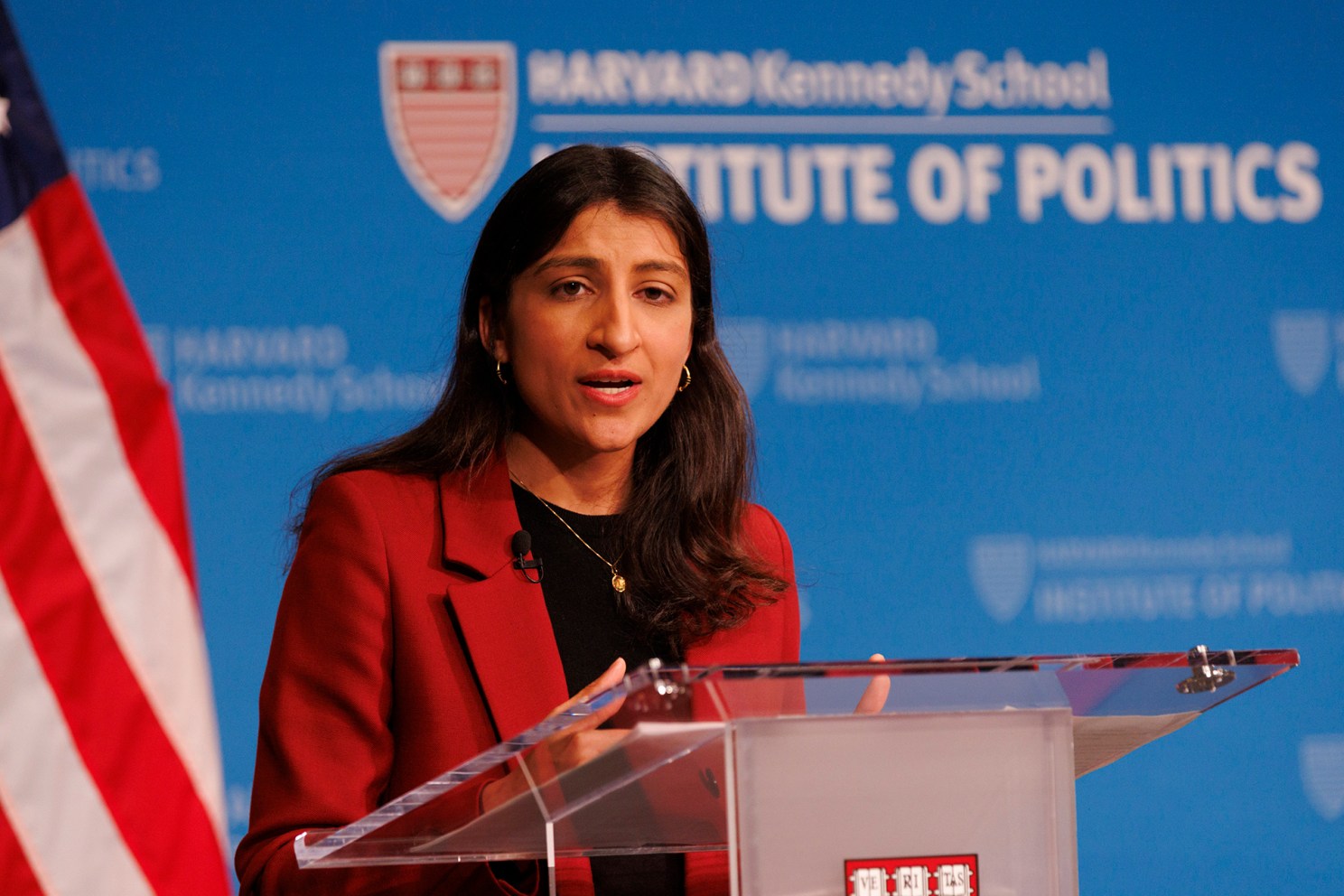Shielding Americans from corporate ‘tyranny’

Niles Singer/Harvard Staff Photographer
Former FTC chair Lina Khan highlights agency’s role in checking concentrated economic power
Antitrust enforcement is not a way for the federal government to penalize highly successful businesses, but rather part of a long tradition of protecting Americans from a kind of economic “tyranny” that can arise when large companies are permitted to overwhelm the commercial landscape, argues legal scholar Lina Khan.
“Anti-monopoly is a governing philosophy that broadly views concentrations of power as a threat to freedom, recognizing that tyranny comes in many guises,” said Khan while delivering the 2025 Stone Lecture on Economic Inequality last week at Harvard Kennedy School. “Just as the Constitution creates checks and balances in our government, safeguarding against concentrated political control, anti-monopoly laws create checks against concentrations of economic power.”
Khan — who served as chair of the Federal Trade Commission from 2021 to January of this year — spoke about the role federal agencies, such as the FTC, can and should play to ensure we don’t repeat the mistakes of the Industrial Revolution. That economic period, she said, concentrated wealth and prompted the establishment of the Interstate Commerce Act of 1887 and the Sherman Antitrust Act of 1890, two of the most important anti-monopoly laws.
During the lecture, and follow-up discussion with Jason Furman, Aetna Professor of the Practice of Economic Policy at the Kennedy School and Harvard’s Department of Economics, Khan talked about her time leading the FTC and the role antitrust regulation can play to remediate the harms that occur when economic power is concentrated in the hands of a few.
While at the FTC, Khan tried to eliminate what she called its “self-imposed red tape and excessive bureaucracy” that had accumulated since the Reagan administration, when anti-regulatory politics first took off. Many internal procedures went above and beyond what the law itself required, further slowing agency actions, said Khan, a member of the Columbia University Law School faculty.
“Just as the Constitution creates checks and balances in our government, anti-monopoly laws create checks against concentrations of economic power.”
Khan first garnered national attention in 2017 for an article she wrote as a 3L at Yale Law School in which she argued that U.S. antitrust regulations were not up to the task of keeping online tech giants like Amazon from becoming monopolies.
Her selection to chair the Federal Trade Commission in 2021 during the Biden administration was controversial and criticized by some in the business community, particularly among Big Tech companies like Google and Amazon who felt the agency’s aggressive approach to antitrust regulation unfairly singled them out.
Not so, Khan said. The FTC’s focus on antitrust enforcement reflected the agency’s larger goal of protecting the millions of consumers who can be hurt when companies are able to control the marketplace, but who have the least power to do something about it.
“We ended up reorienting the FTC’s approach to prioritize tackling misconduct that was resulting in the greatest harm for the greatest number of people. Practically, this meant taking on law breaking by some of the largest corporate players in the most significant sectors of our economy, including dominant providers in agriculture, healthcare, and technology,” said Khan.
During her tenure, the FTC went after firms that falsely claimed their products were made in America, enforced laws that forbade non-compete clauses preventing employees from changing jobs or launching new businesses, issued new rules that banned fake online product reviews, and required companies to make it easy to cancel online subscriptions.
Industry consolidations can have a ripple effect beyond what they do to competitors. When scrutinizing mergers, the FTC looked at the effect it would have not just on customers but on the people who would be working at the new organization, she said.
“One of the lawsuits that we filed blocking the Kroger-Albertsons [supermarket] merger was the first time the government had alleged that a merger was anti-competitive, not just because it would raise prices for shoppers, but also because it would worsen conditions for workers,” an argument the judge recognized as a legitimate basis for anti-competitive mergers, Khan said.
“So there has been some more progress; I think there certainly needs to be more.”
There used to be more fixed rules about what companies could and could not do, particularly around mergers, in order to prevent firms from exceeding a certain level of market concentration. While those rules still exist, the federal government’s approach to antitrust is “much more squishy” than it used to be, Khan said.
The old, structured approach had once been derided by many as needlessly rigid so that “productive” business consolidations would get blocked. But even judges have become frustrated with the current approach, which leaves them with too much discretion, Khan said.
“So, I think there’s a lot of room for improvement in the current antitrust regime, even just from an efficiency perspective,” she said. “One way you could help fix for that is creating more certainty and less discretion in some of the rules, which would also, candidly, be an important safeguard against political weaponization and abuse.”




